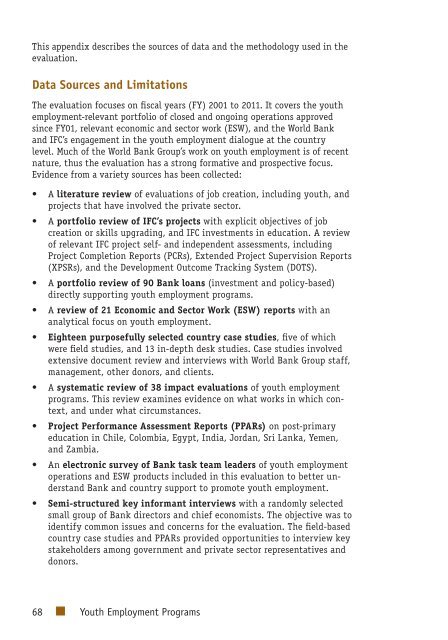Youth Employment Programs - Independent Evaluation Group
Youth Employment Programs - Independent Evaluation Group
Youth Employment Programs - Independent Evaluation Group
Create successful ePaper yourself
Turn your PDF publications into a flip-book with our unique Google optimized e-Paper software.
This appendix describes the sources of data and the methodology used in theevaluation.Data Sources and LimitationsThe evaluation focuses on fiscal years (FY) 2001 to 2011. It covers the youthemployment-relevant portfolio of closed and ongoing operations approvedsince FY01, relevant economic and sector work (ESW), and the World Bankand IFC’s engagement in the youth employment dialogue at the countrylevel. Much of the World Bank <strong>Group</strong>’s work on youth employment is of recentnature, thus the evaluation has a strong formative and prospective focus.Evidence from a variety sources has been collected:• A literature review of evaluations of job creation, including youth, andprojects that have involved the private sector.• A portfolio review of IFC’s projects with explicit objectives of jobcreation or skills upgrading, and IFC investments in education. A reviewof relevant IFC project self- and independent assessments, includingProject Completion Reports (PCRs), Extended Project Supervision Reports(XPSRs), and the Development Outcome Tracking System (DOTS).• A portfolio review of 90 Bank loans (investment and policy-based)directly supporting youth employment programs.• A review of 21 Economic and Sector Work (ESW) reports with ananalytical focus on youth employment.• Eighteen purposefully selected country case studies, five of whichwere field studies, and 13 in-depth desk studies. Case studies involvedextensive document review and interviews with World Bank <strong>Group</strong> staff,management, other donors, and clients.• A systematic review of 38 impact evaluations of youth employmentprograms. This review examines evidence on what works in which context,and under what circumstances.• Project Performance Assessment Reports (PPARs) on post-primaryeducation in Chile, Colombia, Egypt, India, Jordan, Sri Lanka, Yemen,and Zambia.• An electronic survey of Bank task team leaders of youth employmentoperations and ESW products included in this evaluation to better understandBank and country support to promote youth employment.• Semi-structured key informant interviews with a randomly selectedsmall group of Bank directors and chief economists. The objective was toidentify common issues and concerns for the evaluation. The field-basedcountry case studies and PPARs provided opportunities to interview keystakeholders among government and private sector representatives anddonors.68 <strong>Youth</strong> <strong>Employment</strong> <strong>Programs</strong>
















